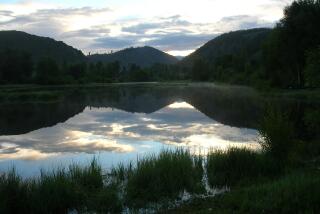State-Run Programs Teach Skills Needed by ‘Outdoorswomen’
- Share via
COVINGTON, Ga. — Jana Miles lined her sights on a white “X” 25 yards away.
Her forefinger squeezed the rifle’s trigger. BANG! The bull’s-eye drew cheers from the other women at the public firing range.
Rifle “markswomanship”--as women firearms instructors call it--was the first class for Miles and others in outdoor pursuits usually claimed by men.
It was one of a dozen activities offered one weekend this fall in a state-run program at a campsite near Covington, about 45 miles east of Atlanta. The workshop, Becoming an Outdoorswoman, teaches women to hunt, fish and camp in a noncompetitive environment.
Miles, a 32-year-old marketing consultant from Atlanta, doesn’t enjoy competitive sports such as tennis. So she signed up for courses as varied as fly fishing, hunting safety and field orienteering. With the latter, you are left in the woods with a compass, a topographical map and a few coordinates to find your way back to base.
Most of the 105 women on this outing, ages 18 to 65, had been camping or hiking before, but a majority had never touched a gun, stalked a deer or cast a line.
“How many of you think of Bambi when you think of deer hunting?” asked instructor Susan Morris, a game warden with the state Department of Natural Resources. Nearly everyone raised hands.
“I’m here to tell you that Bambi isn’t real,” she said. “Deer don’t sing and dance in the woods.”
With that, she explained hunting laws and etiquette. For one, don’t tie a deer atop a car.
“It’s like a trophy to a lot of hunters,” she said. “They want to show it off. Non-hunters are offended. And these are the people who hold your hunting rights in their hands when it comes time to vote.”
Although most instructors were women, several men were asked to teach--and to be respectful. “It must be a comfortable environment--no pressure, no competition,” camp director Beth Brown said. And no room for terms such as “girls,” “babes” or “honey.”
That’s why Valerie Zentz of North Augusta, S.C., and her friends have returned to the camp for the last three years. “Here, you get to be taken seriously. They are not talking over your heads,” said Zentz, an administrator at a nuclear weapons complex.
Last year, after two sessions of wilderness camp, she said she shopped for a Remington rifle with a short, wooden stock to use in competition. When she was shown rifles with teal and purple stocks, she recoiled, disgust creasing her face even now. “You want to say, ‘Come on, guys, take me seriously. Do you think a man would ever consider using a rifle like that?’ ”
In addition to the usual how-to’s, they also learned some things for women only. Upon firing, the butt of a rifle can cause bruises when it comes in contact with hardware on bra straps.
And put a slight bend on the arm extended for the bow because extra tissue on a woman’s elbow can get in the arrow’s path and cause welts.
Wildlife agencies designed the camp and others in the United States and Canada to attract more hunters and bolster revenues from taxes and licenses. There is very little money for advertising, but the annual outing is popular nevertheless. “The women who come here tell their friends, and their friends tell their friends,” Brown said.
One target is single mothers who know nothing about the outdoors, insisted Shelley Southerland, a state firearms instructor from Savannah. “When it comes to hunting, especially, they’re automatically going to tell their children no,” she said. “That’s lost future revenue.”
For Mary Lou Ramsey, 44, of Martinez, the weekend offered different value. “It’s important for women to have a place to get together . . . to network, to try some new things.”
That night, she was among a group gathered around the campfire, toasting marshmallows, drinking Diet Coke and swapping stories.
Back at the bunkhouse, Miles and 16 bunkmates were negotiating over showers. Three private bathrooms offered pink plastic curtains on shower stalls.
She laughed when she recognized the smell of insect repellent and perfume. It reminded her of childhood summers here, filled with sing-alongs, nature hikes and swimming lessons.
Fifteen years later, Miles was back, sleeping in the same frame bunk beds, eating the same cold cuts and chicken strips.
This time, she’s working at being a wilderness woman.
“Every year, my brothers go hunting with my dad, and they fill up three freezer chests with deer meat,” she said. “I want to be able to participate in that.”
More to Read
Sign up for Essential California
The most important California stories and recommendations in your inbox every morning.
You may occasionally receive promotional content from the Los Angeles Times.










